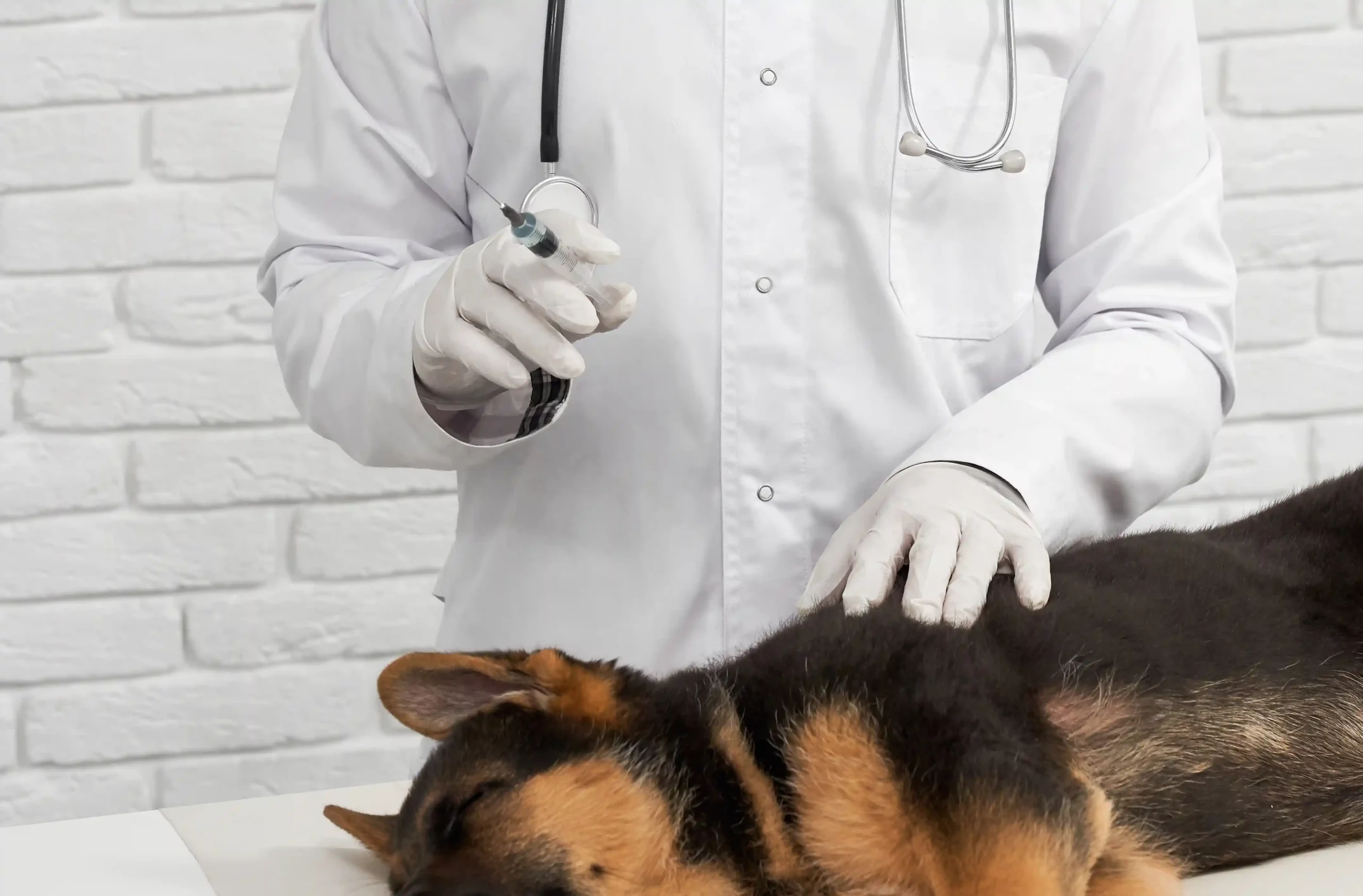Dog parasites are common organisms that can cause harm and discomfort to your furry friend. These parasites come in different forms, such as internal and external parasites.
Internal parasites, like roundworms and heartworms, live inside the dog’s body and can cause serious health issues. Unwanted guests like fleas and ticks may set up camp in your dog’s fur, causing discomfort, skin woes, and the risk of passing on diseases.
It is crucial to prevent and treat dog parasites to ensure the overall well-being of your pet. This guide will provide you with valuable information on how to identify, control, and treat dog parasites effectively.
A Common type of dog parasites
Different parasites can bother your dog, and it’s good to know about them. Some live inside, like roundworms, tapeworms, hookworms, and whipworms. They usually come from dirty soil or by eating stuff from other animals.
Then, there are outsiders like fleas and ticks that can bug your dog’s fur, making them uncomfortable. Also, mites and lice might be a headache. Regularly checking for these bugs and doing things to stop them is crucial for keeping your dog healthy and happy.
Importance of preventing and treating dog parasites
Keeping your pet free from parasites is super important for their health. Parasites can bring lots of problems for dogs, like making them lose weight, get anemia, or have tummy troubles. Doing things like checking often for parasites, getting vaccinations, and keeping things clean can lower the chances of your dog getting bugs.
If your dog does get parasites, using the right medicines and following what your vet says can get rid of them and stop more problems. Taking these steps means your furry friend can enjoy a happy and healthy life.
External Parasites
Dogs often deal with bothersome bugs that can make them uncomfortable and cause health problems. Two common ones are fleas and ticks. Fleas are tiny bugs that snack on your dog’s blood, making them itchy and causing skin issues.
Ticks are like little spiders that latch onto your dog and can pass on diseases. To stop these pests, it’s vital to use things like flea and tick prevention stuff, such as medications or collars.
It’s really important to check your dog regularly for any signs of bugs. And don’t forget, keeping your dog’s space clean and practicing good hygiene helps steer clear of these critters.
A Fleas: Identification and Prevention
Tiny blood-sucking bugs called fleas can make your dog super uncomfortable. To spot them, watch out for signs like your dog scratching a lot, biting their skin, or little black dots (that’s flea poop!) on their fur.
Stopping fleas is key, so use stuff like flea prevention products – think topical meds or collars that can kill and keep fleas away.
Keep your dog’s space clean by vacuuming and washing their bedding often. And if you want to go the extra mile, treat your home and yard to keep those fleas from setting up camp.
Ticks: Removal and Avoidance
Ticks are usual troublemakers that can latch onto your dog and spread diseases.
If you see a tick, get some tweezers, grab it close to the skin, and gently pull it straight out. Don’t twist or squeeze it, as that might leave parts behind.
Toss the tick in a sealed container or flush it down the toilet. To steer clear of ticks, stay away from tall grass and use tick prevention things like collars or meds.
Keep an eye on your dog for ticks, especially after they’ve been outdoors.dog for ticks, especially after spending time outdoors.
Internal Parasites
Dogs often deal with pesky internal parasites that can bring a bunch of health problems. Some usual suspects are roundworms, tapeworms, hookworms, and whipworms.
These bugs can sneak into your dog through contaminated food, water, or soil, causing issues like diarrhea, weight loss, and a not-so-great coat. To kick them out, your vet will give you deworming meds.
Preventing these bugs is key, so do things like regular check-ups, keep things clean, and use monthly preventatives as your vet suggests.
A Roundworms: Symptoms and Treatment
Roundworms are a common type of internal parasite in dogs. They typically infect puppies, but adult dogs can also be affected. Some common symptoms of roundworm infestation include diarrhea, vomiting, weight loss, and a pot-bellied appearance.
In severe cases, you may even see roundworms in your dog’s vomit or feces. Treatment for roundworms involves deworming medications prescribed by your veterinarian. These medications work to eliminate the parasites from your dog’s body.
It’s important to follow your veterinarian’s instructions for dosing and to administer the entire course of treatment to effectively get rid of the roundworms.
Heartworms: Prevention and Medication
Heartworms are a serious and potentially deadly parasite that can infect dogs. To dodge heartworm disease, it’s super important to prevent it. You can do this by using heartworm prevention meds your vet recommends—like monthly chewables or topical treatments.
These medications work by killing the larvae and preventing the development of adult heartworms. It’s essential to administer the medication consistently and on schedule to ensure its effectiveness.
Regular heartworm testing is also recommended to catch any infections early and start treatment promptly if necessary.
Preventative Measures
Preventative measures are essential for protecting your dog from parasites. Here are some critical steps you can take:
- Keep your dog healthy with regular shots and check-ups. Some illnesses can weaken their immune system, making them more vulnerable to bugs.
- Keep things clean for your dog by tidying up their space—clean their bedding, toys, and food bowls regularly. This helps lower the chance of bugs moving in.
- Regularly Groom Your Dog: Regular grooming, including brushing and bathing, can help detect and prevent parasites.
- Practice Proper Waste Disposal: Scoop up after your dog right away and toss the waste properly to cut down on parasites spreading around.
- Keep your dog away from animals that might be sick. Try to limit their time around other animals, especially in places where parasites are common.
Doing these things to prevent problems can really cut down the chance of your dog getting bugs.
Regular Vaccinations and Check-ups
Keeping your dog healthy is a big deal. Get them shots and check-ups regularly—they help fend off sickness and keep bugs away. Your vet will set up a shot plan based on your dog’s age and lifestyle.
Check-ups help the vet catch any signs of bugs early on. Stay on top of shots and check-ups to give your dog the best defense against parasites.
Maintaining Proper Hygiene and a Clean Environment
To prevent the spread of dog parasites, it’s crucial to maintain proper hygiene and a clean environment for your furry friend. Here are some essential steps to follow:
- Regularly clean and disinfect your dog’s bedding, toys, and living areas.
- Keep your dog’s living space clean and free from feces, as they can attract parasites.
- Avoid overcrowding and maintain good ventilation in your dog’s living area.
- Dispose of your dog’s waste properly to prevent contamination of the climate.
- Practice good personal hygiene by washing your hands after handling your dog or cleaning up after them.
Keep things tidy and clean for your dog to stop parasites from spreading and to keep them healthy.
Treatment Options
When it comes to treating dog parasites, there are various options available. Here are a few to consider:
- Over-the-counter Parasite Medications: These medications can be purchased without a prescription and are typically available in the form of spot-on treatments or oral medications. They generally target a specific type of parasite, such as fleas or worms.
- Prescription Medications and Professional Treatment: In more severe cases or for certain parasites like heartworms, a veterinarian may prescribe medication or recommend professional treatment. These options may include injections, topical treatments, or other specialized medications.
Always talk to your vet to figure out the best way to treat your dog’s particular bug problem.
An Over-the-counter Parasite Medication
You can easily get parasite meds for your dog without a prescription. They come in different types, like spot-on treatments or pills, aiming at specific bugs like fleas or worms. Make sure to read the instructions and pick what suits your dog. But, it’s a good idea to talk to your vet before using any over-the-counter stuff.
Prescription Medications and Professional Treatment
To keep your dog safe from bugs, there are prescription meds and pro treatments. Your vet can suggest meds that fit your dog just right—these are usually stronger than store-bought stuff.
Sometimes, pros are needed, like for big flea troubles or tricky worms. Your vet will tell you how much and how often to use the meds. Following their advice is a must for the best results and your pet’s health.
Make sure to follow their directions closely to get the best outcomes and keep your pet healthy.
Best practices for preventing and treating dog parasites
When it comes to preventing and treating dog parasites, there are several best practices to follow:
- Administer regular preventative medications: Use prescribed flea, tick, and heartworm preventatives to protect your dog from parasites.
- Keep your dog’s environment clean: Regularly clean and disinfect your dog’s living area, bedding, and toys to minimize the risk of infestation.
- Practice good hygiene: Wash your hands thoroughly after handling your dog or cleaning up after them to prevent the spread of parasites.
- Monitor your dog’s health: Watch for any signs of parasite infestation, such as changes in appetite, weight loss, or a dull coat, and consult your vet promptly if you suspect an issue.
- Stick to a regular veterinary schedule: Schedule routine check-ups and vaccinations to detect and address any potential parasite problems early on.
By following these best practices, you can effectively prevent and treat dog parasites, ensuring the health and well-being of your furry friend.
Conclusion
In conclusion, preventing and treating dog parasites is essential for the health and well-being of your pet. By implementing a comprehensive parasite control plan, including regular vaccinations, check-ups, and maintaining proper hygiene, you can significantly reduce the risk of infestation.
Over-the-counter and prescription medications can effectively treat and prevent various types of parasites, providing your dog with the necessary protection.
Remember to follow your veterinarian’s recommendations and dosage instructions for the best results. Investing in safe and effective parasite control products will help ensure the long-term health of your beloved furry friend.

